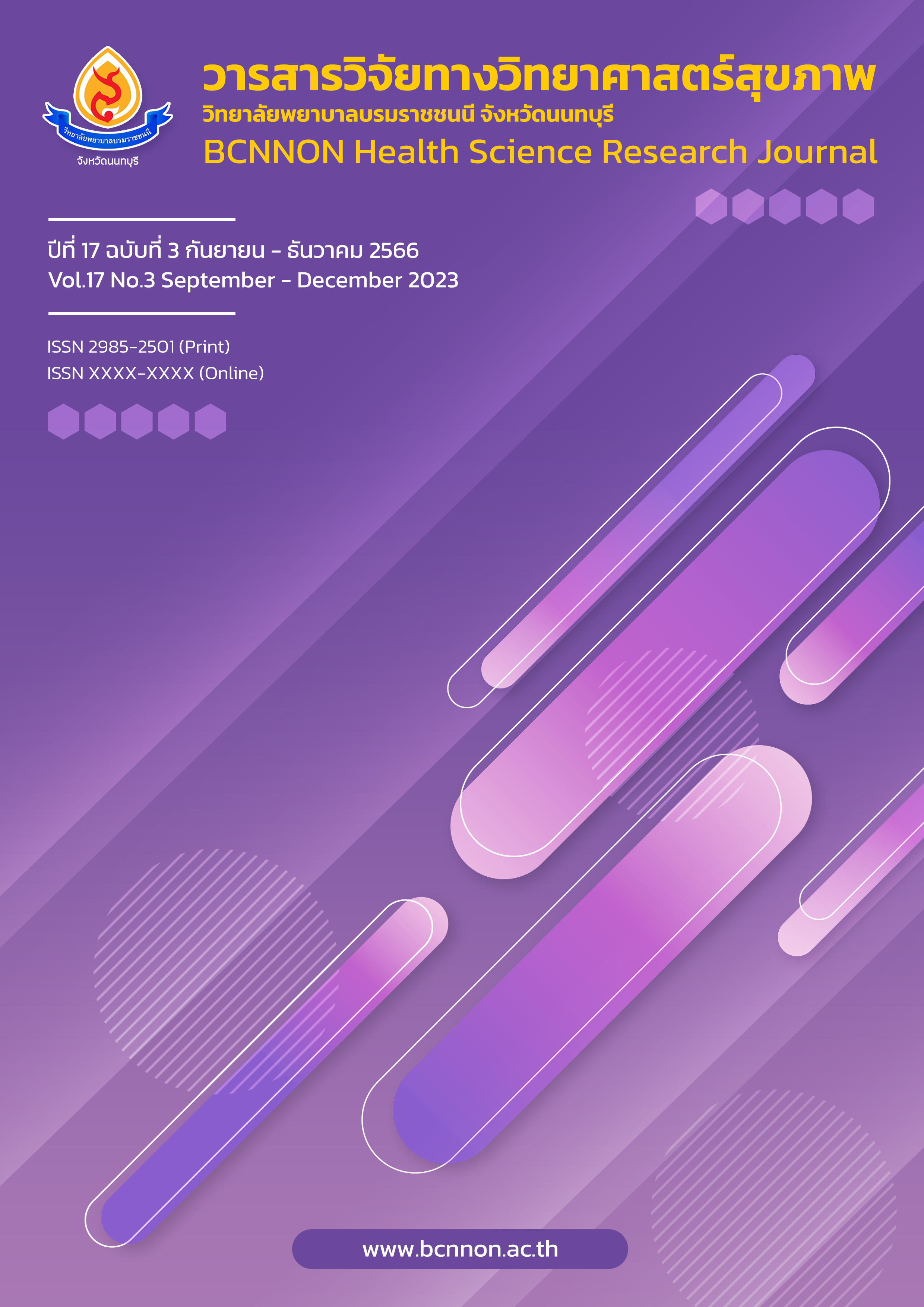ผลของโปรแกรมการเสริมสร้างพลังสุขภาพจิตต่อพลังสุขภาพจิตในผู้สูงอายุ
Main Article Content
บทคัดย่อ
บทนำ : โปรแกรมการเสริมสร้างพลังสุขภาพจิตเป็นกิจกรรมเชิงปฏิบัติการที่ออกแบบมา เพื่อเพิ่มพลังสุขภาพจิตในผู้สูงอายุ
วัตถุประสงค์การวิจัย : เพื่อศึกษาผลของโปรแกรมการเสริมสร้างพลังสุขภาพจิตเพื่อเพิ่มพลังสุขภาพจิตในผู้สูงอายุ
วิธีการวิจัย : การศึกษานี้เป็นวิจัยกึ่งทดลองด้วยแบบแผนการทดลองแบบศึกษาสองกลุ่มวัดสองครั้ง ตัวอย่าง คือ ผู้สูงอายุในเขตอำเภอเมือง จังหวัดชัยนาท จำนวน 46 คน แบ่งเป็นกลุ่มทดลองและกลุ่มควบคุม กลุ่มละ 23 คน กลุ่มทดลองได้รับโปรแกรมการสร้างเสริมสุขภาพจิต จำนวน 8 สัปดาห์ ๆ ละ 90 นาที ส่วนกลุ่มควบคุมได้รับเอกสารความรู้เรื่องพลังสุขภาพจิต เครื่องมือที่ใช้ในการเก็บรวบรวมข้อมูลคือ แบบประเมินพลังสุขภาพจิตที่มีค่าสัมประสิทธิ์อัลฟ่าครอนบาคเท่ากับ .91 วิเคราะห์ข้อมูลระดับ พลังสุขภาพจิตด้วยค่าเฉลี่ยและส่วนเบี่ยงเบนมาตรฐาน วิเคราะห์เปรียบเทียบระดับพลังสุขภาพจิตก่อนและหลังการทดลองโดยใช้สถิติ Paired t-test และวิเคราะห์เปรียบเทียบระดับพลังสุขภาพจิตระหว่างกลุ่มทดลองและกลุ่มควบคุมด้วยสถิติ Independent t-test
ผลการวิจัย : หลังได้รับโปรแกรมการเสริมสร้างพลังสุขภาพจิต กลุ่มทดลองมีคะแนนเฉลี่ยพลังสุขภาพจิตสูงกว่าก่อนการทดลองและสูงกว่ากลุ่มควบคุมอย่างมีนัยสำคัญทางสถิติที่ระดับ .01
สรุป : โปรแกรมการสร้างเสริมสุขภาพจิต สามารถทำให้ผู้สูงอายุมีพลังสุขภาพจิตสูงขึ้น บุคลากรทางด้านสาธารณสุขสามารถประยุกต์กิจกรรมในโปรแกรมไปใช้เป็นแนวทางในการเสริมสร้างพลังสุขภาพจิตในประชาชนกลุ่มวัยอื่น ๆ ได้
Downloads
Article Details

อนุญาตภายใต้เงื่อนไข Creative Commons Attribution-NonCommercial-NoDerivatives 4.0 International License.
บทความที่ได้รับการตีพิมพ์เป็นลิขสิทธิ์ของวิทยาลัยพยาบาลบรมราชชนนี จังหวัดนนทบุรี
ข้อความที่ปรากฏในบทความแต่ละเรื่องในวารสารวิชาการเล่มนี้เป็นความคิดเห็นส่วนตัวของผู้เขียนแต่ละท่านไม่เกี่ยวข้องกับวิทยาลัยพยาบาลบรมราชชนนี จังหวัดนนทบุรี และคณาจารย์ท่านอื่น ในวิทยาลัยฯ แต่อย่างใด ความรับผิดชอบองค์ประกอบทั้งหมดของบทความแต่ละเรื่องเป็นของผู้เขียนแต่ละท่าน หากมีความผิดพลาดใด ๆ ผู้เขียนแต่ละท่านจะรับผิดชอบบทความของตนเองแต่ผู้เดียว
เอกสารอ้างอิง
Department of Older Persons, Ministry of Social Development and Human Security. Current aging society and economy in Thailand. [internet]. 2021 [cited 2022 Oct 4]; Available from: https://www.dop.go.th/th/know/ 15/926. (in Thai).
Foundation of Thai Gerontology Research and Development Institute, Institute for Population and Social Research, Mahidol University. Situation of the Thai older persons 2021. [internet]. 2022 [cited 2022 Oct 2]; Available from: https://www.dop.go.th/th/know/side/ 1/2/1747. (in Thai).
National Statistical Office, Ministry of Digital Economy and Society. Demographic, population and housing statistics. [internet]. 2022 [cited 2022 Oct 15]; Available from: http://statbbi.nso.go.th/staticreport/page/sector/th/01.aspx.
Parayat C, Kangchai W, Somanusorn S. Predictive factors of resilience among elderly. The Journal of Faculty of Nursing Burapha University. 2016;24(2):97-106. (in Thai).
Department of Mental Health, Ministry of Public Health. Guidelines for psychological social care of the elderly to prevent mental health problems. 4th ed. Nonthaburi: Agricultural Cooperative Federation of Thailand; 2015. (in Thai).
Thongkhum K, Peungposop N, Sakunpong N. Resilience in the elderly: concept and approaches to promoting resilience. The Journal of Faculty of Nursing Burapha University. 2021;29(1):105-16. (in Thai).
Mekkhachorn N. Resilience: a new approach of mental empowerment for dealing with current life crisis. Journal of Psychology Kasem Bundit University. 2021;11(2):1-9. (in Thai).
Department of Older Persons, Ministry of Social Development and Human Security. Action plan on the elderly, phase 3 (2023-2037) [internet]. 2023 [cited 2022 Jul 2]; Available from: https://www.dop.go.th/th/laws/ 1/28/843. (in Thai).
Grotberg EH. Resilience for today: gaining strength from adversity. Westport, CT: Praeger; 2003.
Chaosuansreecharoen RK, Chaosuansree charoen P, Khongsanit S. Effectiveness of resilience enhancing program in elderly residents at Ban Sritang Nursing Home. Nursing Journal of the Ministry of Public Health. 2019;29(1):32-47.(in Thai).
Photipim M, Pholsrioradit P, Bonyaphagorn S, Bonyaphagorn J, Ketbumroong V, Norkaew J, et al. Effect of resilience-enhancing program on resilience quotient among older adults, Nakhon Ratchasima Province. Journal of Vongchavalitkul University. 2021;34(2):30-43. (in Thai).
Koolnaphadol P, Haenjohn J. Education and development of resilience among elderly by intrgrating the participantion process of the family and civil society network. Chonburi: Burapha University; 2015. (in Thai).
Chainat Provincial Public Health Office, Ministry of Public Health. Annual report 2022. Chainat: Chainat Provincial Public Health Office; 2022. (in Thai).
Faul F, Erdfelder E, Lang AG, Buchner A. G* Power 3: a flexible statistical power analysis program for the social, behavioral, and biomedical sciences. Behav Res Methods. 2007;39(2):175-91. doi: 10.3758/bf03193146.
Department of Mental Health, Ministry of Public Health. Resilience quotient. Nonthaburi: Beyond Publishing Company; 2020. (in Thai).


